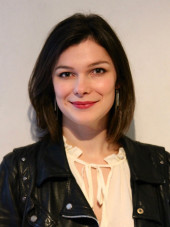A look into the life of a translator
Vom 17/04/2018

Cloé Crétal
Translator from English and Spanish into French, Project Manager
Born in: Lille, France
Why did you decide to become a translator?
I was born into a 100% French-speaking family (to say the least!), meaning that I didn’t at all inherit the polyglot gene... But that’s not to say I couldn’t develop a passion for languages through meeting people, travelling, books, films and music!
I’d say I became a translator to build bridges between cultures and populations, to create dialogue, connections, exchanges between people, institutions or companies who want to share ideas but who don’t speak the same language. A translator is like a conveyor of meaning thanks to whom the magic of communication can take place!
When and how did you learn English and Spanish?
I learnt languages at school from primary through to secondary, in a very ordinary way, actually! That’s why, with regards linguistic foundations at least, my thanks go first and foremost to the French education system (believe it or not!).
I owe my further learning of English and Spanish to my studies at ISIT, of course, as well as various internships and long stays abroad. There’s nothing better for learning a language than true immersion in the country, in contact with the locals and the national culture. And of course, I followed the timeless advice given to anyone who wants to learn a foreign language: read, listen to music and the radio and watch films and series.
What do you like most in translation?
I’m naturally very curious and am always keen to learn new things. This comes in handy because, to be a translator, you need to be extremely curious and want to learn things every day, such as fermentation methods of Cava, how a helicopter motor is made or management methods in a large international company… You work hard to learn about a whole variety of different subjects until you become a veritable expert!
I particularly like audio-visual translation which, in my view, is just as fun as it is demanding. To allow the audience enough time to read everything and see the images, the subtitles mustn’t exceed a certain number of characters (letters, spaces and punctuation), so you have to get your thinking cap on and find the perfect term, which is often the shortest. And that’s where a thesaurus really comes in handy! If your full stop doesn’t fit into the subtitle, you just have to go back to square one and re-work the whole sentence!
I like the mental exercise in translation. I think of translators as jugglers switching constantly from one language to another, one subject to another, who turn sentences over and over to try and always find the right solution. In this sense, they are also like tightrope walkers… you have to follow the thread of a text and not deviate in case you fall into the abyss of misinterpretation or the cloudy depths of poor translation.
What are the biggest challenges of the profession?
1- Trying to stay calm when you hear: “I need a translation of my thesis on Temporomandibular joint disorders. I’ll ask my cousin, she’s bilingual! She spent two weeks in Quebec this summer!”. Translation is something you learn through specialised studies and experience. You wouldn’t go to a year 10 student who has just completed their work experience with a paediatrician about a psoriasis, so don’t entrust your translation to any old “bilingual” person!
2- Proving that human intelligence remains essential throughout the translation process. Translation is currently “under threat” from advances in artificial intelligence and, notably, improvements in automatic translation software, so it is of vital importance that we constantly adapt to new technology and make use of it to deliver an end product of flawless quality.
3- Managing to make the person reading your translation think it was written for them in their language. A good translation should be both fluent and natural-sounding. It should read with no hints of clumsiness and the translator’s hand should at no point be visible. That’s the cruel side of the profession: if you’re good, you go completely unnoticed, but if you’re not so good, you’re the first in the firing line! It’s a profession in the shadows, if you like…
And finally, what’s your dream holiday destination and why?
France! Definitely! A few months ago I was living in Argentina. I came back to France for the Christmas holidays and ended up staying... So there’s no doubt that my own country is my ideal holiday destination!
Meet the rest of the team at The Home of Translation on our "Who are we?" page
Beiträge nach Standort sortieren :
Auf der Suche nach einem bestimmten Thema? Versuchen Sie es mal hier :